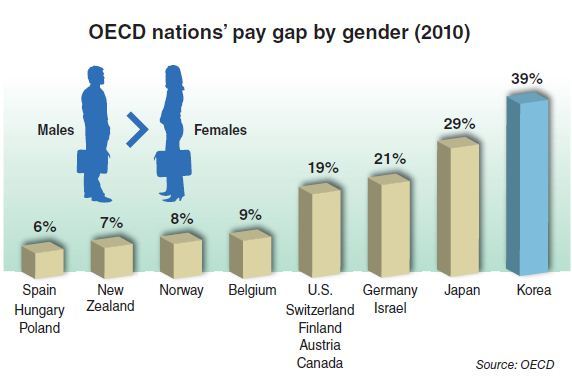Korea’s gender pay gap biggest in OECD
Nation’s gender income gap may widen as core industry shifts from manufacturing to services
By Korea HeraldPublished : Nov. 30, 2012 - 16:05

Women received an average 39 percent lower payment compared to men in Korea, an OECD report showed on Friday.
The gap in Korea was about 2.6 times larger than the average gap among 28 OECD countries, which was 15 percent.
Japan came in second on the list with 29 percent, followed by Germany and Israel, which both marked 21 percent, the U.S., Finland, Switzerland and Austria, which all marked 19 percent, and the U.K. and Czech Republic, with 18 percent.
Hungary, Poland and Spain showed the lowest gender wage gap of 6 percent. The gender wage gap in New Zealand, Norway and Belgium all marked one-digit figures ―7 percent, 8 percent and 9 percent, respectively.
Korea showed the biggest gender wage gap among OECD nations in 2000 as well, with 40 percent.
The gap narrowed by only 1 percent in the past decade, while it dropped by 5 percent in Japan and Canada; 4 percent in the U.S. and Austria; and 3 percent in Israel during the same period.
Experts say that Korean women’s wages are significantly lower than that of men due to pregnancy and childcare burdens. Women who temporarily quit their job to give birth or raise children are not entitled to full-time benefits when they return and often have to restart at lower positions compared to men.
Most of the female workers in the nation are non-regular, which makes their jobs less secure.
Concerns are rising that the gender income gap could widen as the center of nation’s industrial structure is shifting from manufacturing to the service industry. Jobs in the service sector are generally less secure and lower paying.
“European countries which have a good social welfare system tend to provide quality job opportunities in the public sector to absorb female workers. We need to make efforts to create more high quality jobs for women, in line with the development of social services,” Kim Yeong-ok, senior researcher at Korea Women’s Development Institute, was quoted as saying by Yonhap News.
By Park Min-young (claire@heraldcorp.com)
-
Articles by Korea Herald



![[KH Explains] Hyundai Motor’s plan for new landmark keeps hitting bumps](http://res.heraldm.com/phpwas/restmb_idxmake.php?idx=644&simg=/content/image/2024/05/13/20240513050626_0.jpg&u=20240513192803)

![[Grace Kao] American racism against Stray Kids](http://res.heraldm.com/phpwas/restmb_idxmake.php?idx=644&simg=/content/image/2024/05/13/20240513050827_0.jpg&u=)













